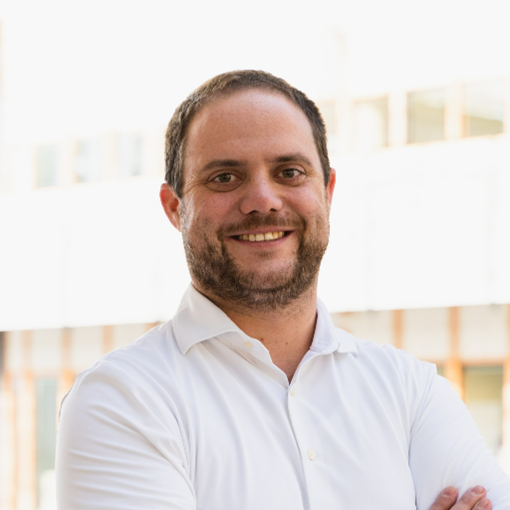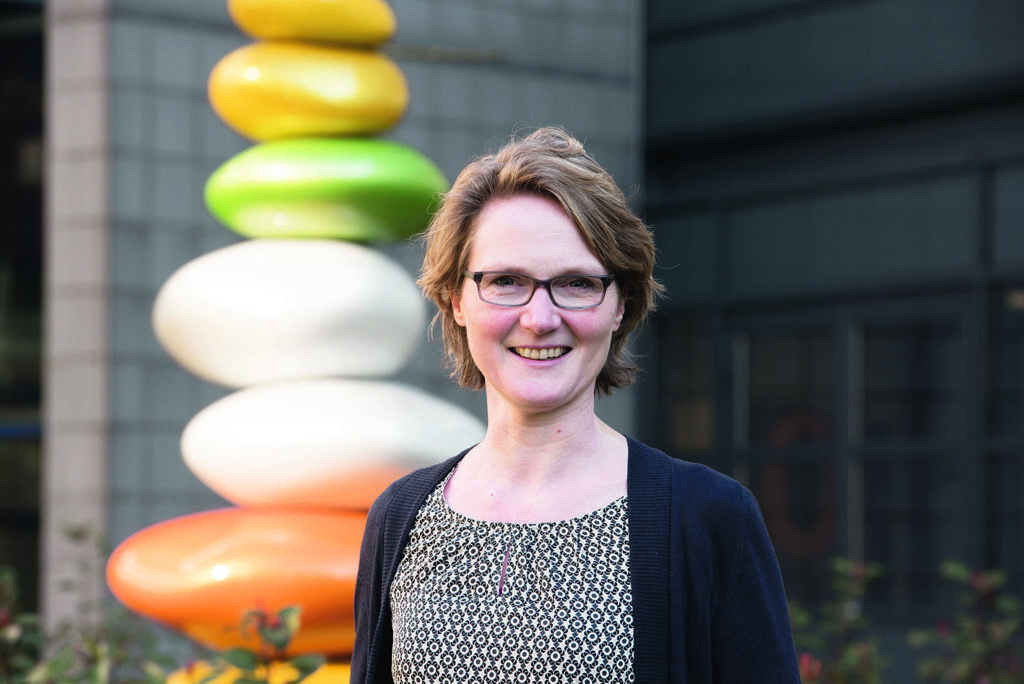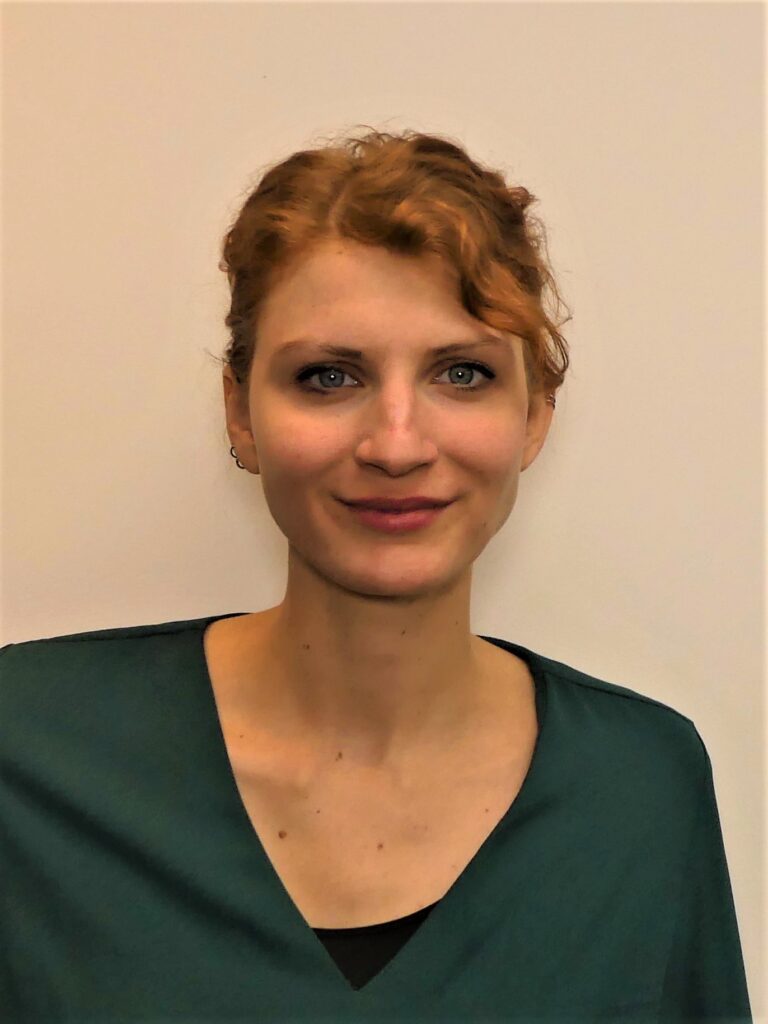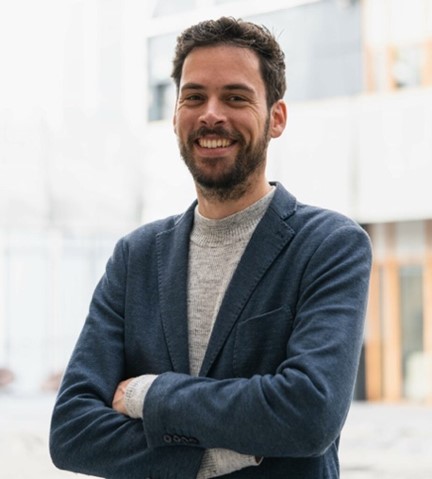Overview all speakers:
- Clara Belzer
- Sam van Beuningen
- Florine Kremer
- Heidi Lesscher
- Roy van der Meel
- Tabea Sonnenschein
- Frederik Verweij
- Florien van de Windt

Dr. Clara Belzer
Associate Professor Microbiology at the Laboratory of Microbiology of Wageningen University & Research
About Clara
The Belzer group is called ‘Microbes Mucus and Milk’ and the research is focused on the interaction of the gut microbiome with host mucus and milk. After obtaining her PhD at the Erasmus Medical Center dr. Belzer did a posdoc at Harvard medical school. By now dr. Belzer has years of experience on gut microbiome studies on anaerobes, including synthetic communities and different biotic concepts, with a special interest for the Akkermansia muciniphila. The group of dr. Belzer works on several microbiome HMO and mucus related topics funded by national and international grants, some also in collaboration medical centers and industry.
Title: Gut Microbial Synthetic communities to study how microbial ecologic networks collaboratively ferment glycans from diet and mucin
Abstract
Glycans from our diet and gut mucin have an impact on the microbial ecologic interactions in the human gut. It is a challenge to unravel the metabolic interactions and trophic roles of the highly complex and individual gut microbiomes. Synthetic minimal gut microbiomes are used as a tool to investigate key microbes in microbial cross-feeding and syntrophic interactions that lead to the degradation of mucin and dietary glycans. In my group we designed synthetic gut microbiomes to study adult (MDb-MM), infant (BIGSyC) and mucosal (PMDs), microbial ecologic and metabolic interactions. Our communities range from 6-16 bacterial species covering all trophic niches and cross-feeding potential within the gut environment of interest. Through 16S rRNA gene-based composition analysis, metabolite measurements, metatranscriptomics and metaproteomics we investigate community dynamics, stability, inter-species metabolic interactions and their trophic roles. Our synthetic communities co-exist in a stable state under in vitro conditions in continuous anaerobic bioreactors. This enables us to tweak ecologic parameters like carbon source and adding or leaving out key microbial species and to study resistance and resilience to such perturbations. Overall, our work provides crucial insights into the co-existence, metabolic niches and trophic roles of key intestinal microbes in a highly dynamic and competitive in vitro ecosystem. As such we provide a model to test the effect of dietary or other changes on the gut microbiome ecologic structure and functionality and a possible alternative to fecal microbiota transplantation.

Dr. Sam van Beuningen
Senior postdoctoral data scientist affiliated with the Department of Pediatric Pulmonology (UMC Utrecht) and the Regenerative Medicine Center Utrecht.
About Sam
Sam van Beuningen is an assistant professor affiliated with the Department of Pediatric Pulmonology (UMC Utrecht) and the Regenerative Medicine Center Utrecht. He has an educational background in molecular biology and holds a PhD in cell biology from Utrecht University. During his PhD project, he gained extensive experience in various molecular biology and advanced microscopy techniques at the Department of Cell Biology (Utrecht University). After obtaining his PhD, Sam continued his career as a Data Science consultant for various large Dutch enterprises. Here he developed various data and machine-learning solutions to improve business processes. Since 2021 he is working within the Centre for Living Technologies where he combines his molecular biology and microscopy knowledge with his data science experience. Sam and his team run the Cellular Screening Technologies facility and the AI lab for Living Technologies where they develop automated lab and AI pipelines for the screening and analysis of patient derived technologies.
Title: AI and Automation in Patient Derived Living Technologies
Abstract
Patient derived cellular disease models have great potential for developing new therapeutics and study biology since they closely represent the human biology. However these system are highly heterogeneous and vast amount of experiments and data are required to get useful insights. During this talk we will show how the use of state-of-the-art automated laboratory set-ups for experimental standardization and Artificial Intelligence in analysis pipelines can speed-up and standardize this process.

Florine Kremer
Researcher Consumer Behaviour at Wageningen University & Research
About Florine
Florine Kremer, researcher at Wageningen University and Research, is committed to advancing sustainable and accessible food systems. After completing a BSc in Consumer Behaviour and a master’s in Sustainable Food Consumption, she has worked both in consultancy and academia.
Florine works on multiple initiatives promoting the protein transition across diverse sectors. Her projects range from the national Protein Monitor to implementing behavioral interventions for sustainable and local seafood consumption, and assessing protein balance in the Dutch prison system. Aside from plant-based proteins, she also works on more sustainable animal-based proteins and alternative proteins.
Florine is at the forefront of the protein transition movement, utilizing her expertise in multi-stakeholder processes and consumer behavior research. At the Navigating Transitions Conference, she will offer insights into interventions to guide consumer behaviour.
Title: Designs to guide consumers towards desired behaviour in the food environment
Abstract
This presentation offers a concise overview of how to study consumer behavior and use behavioral interventions to encourage healthier and more sustainable consumption habits. We’ll start by understanding the factors that influence consumer choices, which are not only rational but also deeply affected by unconscious and emotional elements. Through examples from our research, I’ll outline the essential requirements for effective behavioural interventions, offering key insights into what works and what doesn’t. This talk aims to give you practical tips on fostering sustainable consumer habits through targeted behavioral strategies.

Dr. Heidi Lesscher
Associate professor in Behavioural Neuroscience, Department of Population Health Sciences, Faculty of Veterinary Medicine, Utrecht University
Co-Chair Thriving and Healthy Youth, Dynamics of Youth
About Heidi
Heidi Lesscher, associate professor in Behavioural Neuroscience, obtained her PhD in 2004 at Utrecht University. She is an expert on the neurobiology of reward and addiction related processes. She did her postdoctoral training at the University of California San Francisco and, upon her return to the Netherlands, received personal grants to implement animal models to study the individual variation in and neurobiological underpinnings of individual differences in the risk for mental disorders, with a particular focus on substance addiction. More recently, her work focused on the role of play in the development of mental health. Her research is increasingly interdisciplinary and she is one of the chairs of the Dynamics of Youth community Thriving and Healthy Youth at Utrecht University. In collaboration with game researchers, social scientists, pediatricians and societal partners she studies the role of play in the development of mammals in a truly interdisciplinary manner.
Title: Playing for mental health
Abstract
Play is fun, and we recognize play when we see it. But play is also important for healthy social, emotional and cognitive development. Play allows children (and animals) to experiment with their behavioural repertoire, with social interactions and to learn from challenges they face. We know a lot about play and the importance of play from research with rodents. Research in rats has shown that not being able to play affects the development of brain and behaviour in the social, emotional and cognitive domain. What are the implications for children who are limited in their opportunities to play? Could play be a key to preventive health?

Dr. Roy van de Meel
Assistant Professor of Precision Medicine at the TU/e’s Biomedical Engineering department
About Roy
Roy van der Meel is a biomedical engineer specialized in nanomedicine and RNA therapeutics. After obtaining a PhD from Utrecht University under guidance of Wim Hennink and Gert Storm, and a postdoc appointment at the UMCU in Raymond Schiffelers’ lab, he moved to Pieter Cullis’ lab at the UBC in Vancouver, Canada. During postdoctoral tenure, he gained extensive experience with developing lipid nanoparticle (LNP) technology that has enabled the approval of the first siRNA therapeutic Onpattro® and the COVID-19 mRNA vaccines. In 2019, he was recruited to TU/e Willem Mulder and appointed Assistant Professor in the Precision Medicine group. His current research focuses on establishing platform nanotechnology for delivering RNA therapeutics to specific immune cells and regulating the innate immune response. He has co-authored over 50 publications in leading nanotechnology-focused journals including Nature Nanotechnology, Nature Biomedical Engineering, and ACS Nano.
Title: Engineering platform nanotechnology for RNA delivery to immune cells
Abstract
Nucleic acid therapeutics are revolutionizing healthcare via gene inhibition, addition, replacement or editing. However, nucleic acid-based drugs require chemical modifications and sophisticated nanotechnology to prevent their degradation, reduce immunostimulatory effects, and ensure intracellular delivery. Lipid nanoparticle (LNP) technology is the current gold standard platform that enabled the clinical translation of the first siRNA drug Onpattro and the COVID-19 mRNA vaccines. Nevertheless, current LNP systems are mostly suited for vaccine purposes following local administration or hepatic delivery following intravenous administration. To unleash RNA’s full therapeutic and prevention potential, I will introduce modular nanoplatform technology for systemic nucleic acid delivery to immune cells in hematopoietic organs using apolipoproteins.

Tabea Sonnenschein
PhD Candidate in ABM Simulation of Urban Health Interventions| Urban Data Scientist and Geographer
About Tabea
Tabea is a PhD Candidate focused on developing spatial agent-based models that simulate the health and social impacts of urban health interventions. Such interventions target environmental stressors like air pollution, heat and noise, as well as health behaviors such as physical activity by changing the transport system, land use or spatial organisation of a city in order to prevent detrimental exposures and corresponding disease risks. She takes part in the EU-funded EXPANSE and EXPOSOME-NL projects. Apart from the Institute of Risk Assessment Sciences (IRAS), she is currently affiliated to the Human Geography and Spatial Planning group and the Center for Complex System Sciences at Utrecht University as well as the Exposome and Planetary Health group of the University Medical Center Utrecht. She is a former visiting student of Siqi Zheng at the MIT Sustainable Urbanization Lab. Tabea is interested in using computational tools to understand and address urban problems related to social inequality, climate change and public health.
Title: Urban Health and Scenario Modeling
Abstract
With ever more people living in cities worldwide, it becomes increasingly important to understand the positive and negative impacts of the urban habitat on livability, health behaviors and health outcomes. However, implementing interventions that tackle health in complex urban systems can be costly and have long-term, sometimes unforeseen and indirect, impacts. Hence, it is crucial to not only assess the health impact of interventions, but also its cost-effectiveness and the social distributional impacts of possible urban exposome interventions before implementing them. One of the most promising methods that can capture complex behavior-environment interactions, exposure dynamics, and social outcomes in a spatial context is spatial agent-based modeling. We present our work on agent-based modeling of transport interventions in the context of the city of Amsterdam. Moreover, we discuss what health means in the context of urban environments and how scenario modeling can help achieving these goals.

Dr Frederik Verweij
Assistant professor Cell Biology, Utrecht University
About Frederik
Frederik Verweij started his PhD in 2009 in Cancer Center Amsterdam where he studied the sorting of a viral oncoprotein into Extracellular Vesicles (EVs). In 2014, he then moved for his Postdoc to the Curie Institute in Paris, France. Supported by an EMBO long-term fellowship, he then the physiology of endogenous EVs in vivo by developing a novel zebrafish embryo model system. Since September 2021, he joined the Center for Living Technologies at the division of Cell Biology, Neurobiology and Biophysics at Utrecht University as PI, where he is leading his group investigating EV biology by developing smart molecular tools in combination with state-of-the-art (live) imaging techniques, thanks to the support of the Dutch Cancer Society (KWF-YIG), The Dutch Research Council (NWO-VIDI) and the European Research Council (ERC-StG).
Title: Message in a bottle: tapping into Extracellular Vesicle communication pathways in vivo
Abstract
Extracellular Vesicles (EVs) are nanometer-sized vesicles secreted by virtually every cell type in our body. By shuttling specific cargo-molecules from one cell to another, they establish intercellular communication pathways able to reprogram recipient cells. As such, EVs are implicated as essential mediators in physiology and pathology. Yet, due to their miniscule size, much of how they behave in real life remains obscure. To unravel these EV-communication pathways and use this knowledge to our advantage, we use molecular tools to visualize and modulate these biological information flows in living model organisms.

Florien van der Windt MSc
Director of Public Health at the Ministry of Health, Welfare and Sport
About Florien
Florien van der Windt currently holds the position of Director of Public Health at the Ministry of Health, Welfare and Sport in the Netherlands. Her work is centered around contributing to public health improvements, with a particular interest in policy innovation.
With extensive experience in governmental roles, she leads efforts to develop and implement local health policies, promote mental health awareness, and ensure a healthy start for infants in their early years. Florien also emphasizes the importance of creating healthy living environments and integrating health considerations into all governmental decision-making processes through the ‘Health in all Policies’ approach. In her role, Florien oversees vaccination programs, infectious disease control measures, and population-wide screenings for sexual health.
Before assuming her current position as Director of Public Health, Florien served in various capacities within the Dutch government, including roles at the Ministry of Finance and the Ministry of Infrastructure, where she contributed to budgetary affairs and traffic safety initiatives, respectively.
Florien van der Windt holds a degree in Bestuurskunde (Public Administration) from the Vrije Universiteit Amsterdam, complementing her practical experience with a strong academic foundation in the principles and practices of public administration and policy.